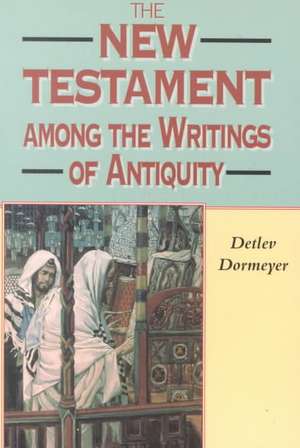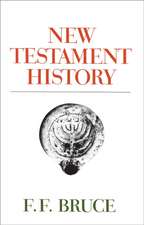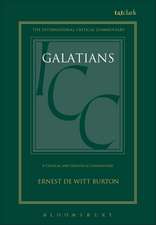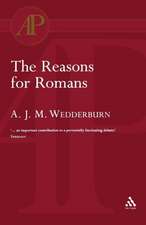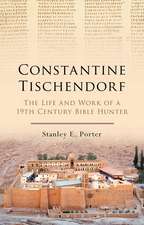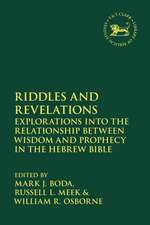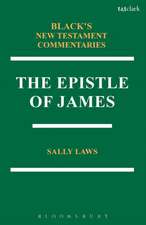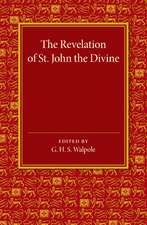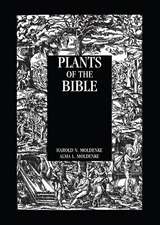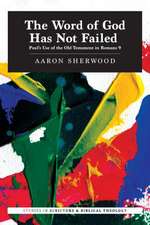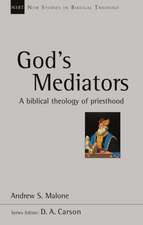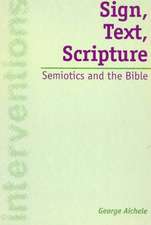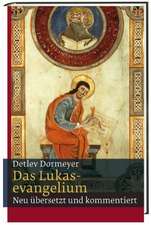New Testament among the Writings of Antiquity: Biblical Seminar
Autor Detlev Dormeyeren Limba Engleză Paperback – 31 dec 1996
In this useful work, Dormeyer assesses the influence of Hellenistic culture upon the New Testament as a literary work. There is no denying the impact of Jewish literature upon the New Testament, but even those Jewish antecedents were themselves not infrequently imprinted with Hellenistic characteristics. Dormeyer's method is to consider in turn the literary forms (Gattungen) of the New Testament, outlining with many examples the parallels between the New Testament and Hellenistic literature. The Synoptic sayings, for instance, are closest in character to the Hellenistic gnome, though the representation of Jesus as an eschatological and prophetic wisdom teacher shows a marked difference from other teachers of wisdom in Hellenistic circles. Other areas of close correspondence with Hellenistic literature lie in the form and rhetoric of the New Testament epistles, and in the structure of the Gospels, which invoke the canons of Hellenistic historiography and biography. Throughout, Dormeyer is at pains to stress the contours of the special quality of the New Testament literature as the product of a quite small community that nevertheless brought into being a number of authors of exceptional talent.
Din seria Biblical Seminar
- 19%
 Preț: 496.04 lei
Preț: 496.04 lei - 14%
 Preț: 659.67 lei
Preț: 659.67 lei - 22%
 Preț: 539.57 lei
Preț: 539.57 lei - 19%
 Preț: 433.56 lei
Preț: 433.56 lei - 22%
 Preț: 716.07 lei
Preț: 716.07 lei - 19%
 Preț: 495.44 lei
Preț: 495.44 lei - 22%
 Preț: 716.15 lei
Preț: 716.15 lei - 19%
 Preț: 498.16 lei
Preț: 498.16 lei - 16%
 Preț: 262.35 lei
Preț: 262.35 lei - 19%
 Preț: 500.77 lei
Preț: 500.77 lei - 22%
 Preț: 837.05 lei
Preț: 837.05 lei - 22%
 Preț: 655.50 lei
Preț: 655.50 lei - 19%
 Preț: 370.61 lei
Preț: 370.61 lei - 22%
 Preț: 593.88 lei
Preț: 593.88 lei - 19%
 Preț: 438.78 lei
Preț: 438.78 lei - 22%
 Preț: 539.99 lei
Preț: 539.99 lei - 19%
 Preț: 432.19 lei
Preț: 432.19 lei - 19%
 Preț: 439.38 lei
Preț: 439.38 lei - 22%
 Preț: 537.44 lei
Preț: 537.44 lei - 22%
 Preț: 534.92 lei
Preț: 534.92 lei - 19%
 Preț: 493.61 lei
Preț: 493.61 lei - 16%
 Preț: 262.62 lei
Preț: 262.62 lei - 22%
 Preț: 715.08 lei
Preț: 715.08 lei - 19%
 Preț: 494.34 lei
Preț: 494.34 lei - 14%
 Preț: 539.99 lei
Preț: 539.99 lei - 11%
 Preț: 495.37 lei
Preț: 495.37 lei - 11%
 Preț: 466.59 lei
Preț: 466.59 lei - 14%
 Preț: 849.63 lei
Preț: 849.63 lei
Preț: 655.74 lei
Preț vechi: 839.08 lei
-22% Nou
125.49€ • 130.53$ • 103.60£
Carte tipărită la comandă
Livrare economică 15-29 aprilie
Specificații
ISBN-10: 1850758603
Pagini: 328
Dimensiuni: 156 x 234 x 17 mm
Greutate: 0.46 kg
Editura: Bloomsbury Publishing
Colecția Sheffield Academic Press
Seria Biblical Seminar
Locul publicării:London, United Kingdom
Notă biografică
Detlev Dormeyer is Professor of Biblical Theology, Department of Theology, University of Dortmund.
Descriere
In this useful work, Dormeyer assesses the influence of Hellenistic culture upon the New Testament as a literary work. There is no denying the impact of Jewish literature upon the New Testament, but even those Jewish antecedents were themselves not infrequently imprinted with Hellenistic characteristics. Dormeyer's method is to consider in turn the literary forms (Gattungen) of the New Testament, outlining with many examples the parallels between the New Testament and Hellenistic literature. The Synoptic sayings, for instance, are closest in character to the Hellenistic gnome, though the representation of Jesus as an eschatological and prophetic wisdom teacher shows a marked difference from other teachers of wisdom in Hellenistic circles. Other areas of close correspondence with Hellenistic literature lie in the form and rhetoric of the New Testament epistles, and in the structure of the Gospels, which invoke the canons of Hellenistic historiography and biography. Throughout, Dormeyer is at pains to stress the contours of the special quality of the New Testament literature as the product of a quite small community that nevertheless brought into being a number of authors of exceptional talent.
